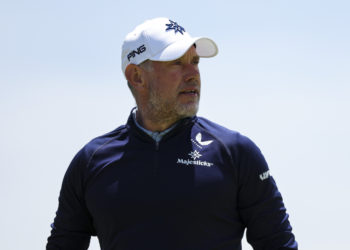When she was in high school, which was not very long ago, Horsegirl’s Nora Cheng chose a Lou Reed quip as her yearbook quote: “One chord is fine. Two chords is pushing it. Three chords and you’re into jazz.”
“You could start a band off of that quote,” says her bandmate and NYU classmate Penelope Lowenstein.
“You could start many bands off of that quote,” says Cheng.
“But we know only 1,000 people bought the quote,” drummer Gigi Reece adds, riffing along with the joke. Cheng, Lowenstein, and Reece may have been born more than five decades after Reed broke up the Velvet Underground, but they all know the old saw about how the group’s first record sold few copies but inspired a legion of imitators.
We’re having a drink at Birdy’s, a dive bar in Bushwick, Brooklyn. A guy and his French bulldog occupy two stools at the bar, and action figures of Ruth Bader Ginsburg and Paul Stanley of KISS sit on shelves behind the bartender. In the back room, there’s a pinball machine and an old photo booth where the band snapped some of their new cover art.
No one seems to know, or care, that the three young people crowded around a table with me are responsible for Versions of Modern Performance, one of the most promising debuts of 2022. It’s an album of loud, insouciant guitar music with impeccable indie-rock cred: released by Matador Records (Pavement, Cat Power, Liz Phair), produced by John Agnello (Kurt Vile, Dinosaur Jr.) at the Chicago studio founded by the late Steve Albini (The Breeders! The Pixies! Nirvana!). Lee Ranaldo and Steve Shelley of Sonic Youth played on it, for God’s sake.
We’re here to talk about their upcoming follow-up, out February 14, which dials down the noise and dials up the Reed-approved minimalism. If anything, Phonetics On and On is even more likely to thrill aging fans (like me) who would love nothing more than to see Gen Z rescue indie-rock from jazz-like museum-piece territory.
But don’t hold that against them.
“At least for the first record, we made those songs to be played live in front of kids, basically,” says Cheng. “So it was kind of strange seeing how other people received it.”
“Suddenly it’s like people older than my dad in the front row being like, ‘This is for me,’ because I’m playing a guitar with distortion,” says Lowenstein. “And I love that those people connect with our music and understand our influences and it means something to them in such a genuine way, but it’s not nostalgia for us, you know?”
The ensuing competition to tie Horsegirl’s sound to ever more arcane rock groups of yesteryear—from My Bloody Valentine and Gang of Four to The Cleaners From Venus and Tall Dwarfs—may have gotten slightly out of hand. “It felt a little bit reductive of our own voices,” Reece observes.
But it also lit a fire in them, to make something no one else could lay claim to. “I feel like we found something on this record,” Lowenstein says, “where we started to just be like, ‘Oh, this sounds like…I don’t know what this sounds like. This sounds like Horsegirl.’”
Cheng and Lowenstein, who trade off on vocals, guitars, and bass, share an apartment not far from Birdy’s, and Reece lives in the neighborhood too. It’s a long way, geographically and psychically, from the Chicago rock scene where Horsegirl made a name for itself playing all-ages shows alongside bands like Lifeguard (Lowenstein’s brother is a member), Friko, Dwaal Troupe, and Post Office Winter.
“We live closer to each other than we ever did,” says Reece. “We’ve found new aspects of our friendship for sure.” Reece, befitting a drummer, is the cutup of the group; Lowenstein has a knack for putting complicated thoughts and emotions into words; Cheng is the quietest, with serious presence and power.
“We had this idea of: Can you write a pop song with one note?”
Reece publishes a zine called My Boyfriend and makes some extra money babysitting. Cheng and Lowenstein are finishing up their studies at NYU. I can’t resist asking if they’ve crossed paths with the school’s most famous, or infamous, current student, Barron Trump.
“Oh my God, no,” says Lowenstein. “My extended family cannot believe he goes to NYU. ‘He’s seven feet tall! How can you miss him?!’
“Most of the time, it feels like no one in my class knows I’m in a band. No one cares,” she continues. “The only time it got a little weird was in my first year of school. We had just released a record and I was missing a lot of school to do Coachella and stuff like that.”
It was quite a ride for three kids who still couldn’t legally order a drink. They toured the US and UK, opened for Wilco, Pavement, and Yo La Tengo, and got stranded at the Glastonbury music festival in rural England. “We didn’t realize how in-the-middle-of-nowhere it was until we passed Stonehenge,” Reece recalls. “We were like, ‘Yooo, Stonehenge!’ Then we’re like, ‘This shit is further out than Stonehenge?”
Happily, they say, they have had no nightmare encounters with other artists. “People have always been really sweet,” says Reece. “We met the Breeders at Coachella and that was such a sweet, sweet moment.”
“I remember you being like, ‘We’re huge fans,’ and Kim Deal was like, ‘I’m a huge fan.’ And then she got our number and made a group chat,” says Lowenstein.
Performing onstage has always been at the center of the Horsegirl phenomenon, but their live sound leveled up considerably over two years of touring. They started thinking about how their second album could build on, and also depart from, everything that had come before.
When I first heard Phonetics On and On, I felt joy tinged with competitive irritation: How can they be this good? Yes, I heard things that reminded me of some of my favorite old bands: Stereolab’s contralto harmonies, Sebadoh’s trebly guitar and huge bass, The Modern Lovers’ hypnotic two-chord stomp. But it was all fresh, alive, and reimagined with exquisite taste. And it ranged much more widely than the first album, from the metallic drone of “Switch Over” to the restrained jangle of “Frontrunner.”
I texted Matador founder Chris Lombardi to express my admiration, and he wrote back: “Right?? They’ve grown so much! I love the intention of the sound and the SPACE! It’s like space is the 4th member.”
That newly spacious sound is the product of several decisions that were indeed intentional. “One thing we knew immediately is we didn’t want the guitar to be distorted at all,” says Lowenstein.
“We got into this vision of a kids’ recital,” adds Cheng, “where you plug directly into the amp and play with a straight clean sound. There’s a playfulness on this record that’s related to that idea.”
Feeling confident in their ability to mesmerize a crowd with only their voices and instruments, they resisted the urge to layer on a lot of noise. “We wanted to strip the sound back a little bit,” says Reece, “and play into what it sounds like with three people playing together.”
They also took Cheng’s yearbook quote and upped the ante, building songs not just around one chord but around a single note. “We had this idea of: Can you write a pop song with one note?” says Lowenstein. The result was “Julie,” the album’s second single. “That inspiration comes a lot from the trio and realizing, when egos don’t get in the way and you’re happy to just play one thing, how cool other things in the band can get.”
The Welsh American musician Cate Le Bon, who produced the new record over two weeks at the Wilco Loft in Chicago, made another bold move that contributed to the minimalist magic. Over Zoom, she tells me she asked Reece to record the drum parts without cymbals, “because I wanted them to hear the songs a little bit differently, so they could really connect with how brilliant these songs that they’ve written are.” The cymbals were added later, “but what happened was there were far less of them than when they were initially played as part of the kit.” Le Bon adds, “They’re such an incredible, musical drummer that it allowed them to, I think, be a bit more playful and lean into the musicality of the parts they were playing.”
The sum total was more space. Space to hear, space to create, space to share.
You can’t spend time with Horsegirl without noticing that they do everything together. All the band stuff—writing, recording, making cover art—but human stuff too. Over the holiday break, they all watched A Complete Unknown. Reece’s parents came, and so did the guys from Lifeguard. “Honestly, I ate it right up,” says Reece.
“I had so much fun seeing that movie,” says Lowenstein, “and seeing it as a musician, and with all my friends being musicians and dating musicians, we all just had this perspective on it. We were like, ‘Bob, put the guitar down while you’re fighting with your girlfriend, please. She’s trying to have a conversation with you. Put the guitar down.’”
Le Bon says their collaborativeness stood out in the studio. “I was absolutely blown away by how good they are at communicating and how considerate they are of one another and how they listened to everything that was happening. It wasn’t like, ‘Oh, my part’s done. I’ll go and drink Topo Chico in the kitchen.’ They made sure that each one of them felt heard. I don’t think I’ve experienced a band communicate in such a clear and honest way before.”
To what does she attribute that? “I don’t know,” Le Bon replies. “I think it might be generational. I’ve never worked with a band that young before.”
At one point toward the end of the session, everyone was getting a bit “loopy and giddy,” so Le Bon tried another experiment. “I said, ‘Right, come on, I’m going to take your phones off you.’ And they were like, ‘Oh, brilliant. We love that idea.’ And so we all put our phones in a pile. And then they started reading aloud from their diaries, reading what they’d written two or three days ago. And I was like, ‘Oh my God, I’m giving you your phones back. This is hell!’”
As my conversation with the band at Birdy’s draws to a close, I throw out a tired old interview question, just to see what happens: Where do you see yourselves at 30?
“I’m still going to be playing music,” says Reece. “I’m always going to be making art. I think that what we’ve gone through together…I can’t imagine us not being very close to each other.”
“And we would stop the band if it got in the way of that,” says Lowenstein.
“Agreed, completely,” says Reece. “And I think for longevity, we need things like you guys going to college. And I think that my heart is set on the longevity of our friendship and our collaboration and our band and our music, but in a very realistic way.”
Then they laugh and add: “Mic drop!”
More Great Stories From Vanity Fair
-
Inside America’s Most Unconventional Counterterror Squad
-
All the Looks From the 2025 Grammys Red Carpet
-
Inside Prince Harry and Meghan Markle’s Big Business Ambitions, 5 Years After Their Royal Exit
-
See the 2025 Oscar Nominations
-
The (Sometimes Silly) Case Against Every Best-Picture Nominee
-
The Sex Abuse Scandal That’s Rocking an Elite Boarding School in the Berkshires
-
How the MAGA World Ignited the Obama Divorce Rumors
-
Beware the Serial Squatter of Point Dume
-
The Best Rom-Coms of All Time
-
From the Archive: Far From the Tree
The post Please Don’t Ask Horsegirl to Rescue Indie Rock From Oblivion appeared first on Vanity Fair.




